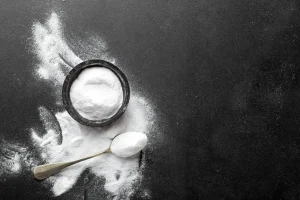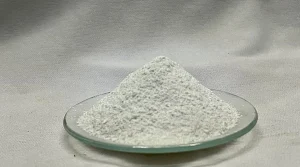Introduction
Sodium benzoate is a common food preservative, widely used to prevent the growth of microbes in acidic foods such as salads, sodas, fruit juices, pickles, and condiments. Chemically known as C7H5NaO2, it is the sodium salt of benzoic acid and is recognized by its E number, E211.
Physical Properties
Sodium benzoate is a white crystalline powder or granule with a faint, sweet aroma. It is extensively used as a preservative in various products due to its efficiency in inhibiting the growth of bacteria, yeast, and fungi. Below are some of its key physical properties:
- Appearance: Sodium Benzoate appears as a white or colorless crystalline powder. It is frequently available in granular or powder form, which makes it convenient to handle and integrate into various products.
- Solubility: It dissolves readily in water, with a solubility of about 630 grams per liter at room temperature (25°C). This high solubility allows it to be easily dissolved in aqueous solutions, which is beneficial for its use in food and beverage preservation.
- Melting Point: Sodium Benzoate has a melting point of about 300°C (572°F). Its high melting point demonstrates its thermal stability, which is beneficial for a range of industrial applications.
- Boiling Point: Sodium Benzoate decomposes before boiling, so it has no specific boiling point. Upon heating, it breaks down into benzoic acid and sodium oxide.
- pH: Sodium Benzoate exhibits a slightly alkaline pH in aqueous solutions, typically around 7.5 to 8.0. This property is important for its effectiveness as a preservative, as it works best in slightly acidic to neutral environments.
- Density: The density of Sodium Benzoate is approximately 1.44 g/cm³. This relatively low density makes it lightweight and easily transported in bulk quantities.
- Hygroscopicity: Sodium Benzoate is non-hygroscopic, which means it does not readily absorb moisture from the air. This characteristic helps maintain its stability and shelf life during storage.
Preparation Methods
Sodium Benzoate is commonly synthesized through both industrial and laboratory methods. Below are the primary methods used for its preparation:
Industrial Production Methods
Neutralization of Benzoic Acid
This is the most common method of producing Sodium Benzoate on an industrial scale. It involves the neutralization of benzoic acid with sodium hydroxide (NaOH).
Process
1. Benzoic acid (C7H6O2) is dissolved in water.
2. The solution is treated with sodium hydroxide.
3. The reaction between benzoic acid and sodium hydroxide produces Sodium Benzoate (C7H5NaO2) and water (H2O).
4. The resulting solution is then evaporated to obtain Sodium Benzoate crystals, which are subsequently dried and packaged.
Chemical Equation
C7H6O2+NaOH→C7H5NaO2+H2O
Direct Reaction with Sodium Carbonate
Another method involves reacting benzoic acid with sodium carbonate (Na2CO3).
Process
Benzoic acid is mixed with sodium carbonate in water.
The reaction produces Sodium Benzoate, carbon dioxide (CO2), and water.
The mixture is filtered, and the Sodium Benzoate is crystallized out.
Chemical Equation
2C7H6O2+Na2CO3→2C7H5NaO2+CO2+H2O
Applications of Sodium Benzoate

Sodium Benzoate is widely used across various industries due to its preservative properties and chemical stability. Here are some of its primary applications:
Food Industry
Sodium Benzoate is extensively used as a preservative in the food industry. It effectively inhibits the growth of bacteria, yeast, and fungi, thus extending the shelf life of various food products.
Common Products
- Soft drinks and fruit juices
- Pickles and sauces
- Salad dressings
- Jams and jellies
- Baked goods
Flavoring Agent
In addition to its preservative properties, Sodium Benzoate can also be used as a flavoring agent in certain food products to enhance taste.
Medicinal Formulations
Sodium Benzoate is used in various medicinal formulations as an antimicrobial preservative. It ensures the stability and safety of liquid medications, including syrups, cough mixtures, and other oral solutions.
Specific Uses
- Preservative in liquid pharmaceuticals
- Component in cough syrups and other therapeutic solutions
Personal Care and Cosmetics
Preservative in Personal Care Products
Common Products
- Shampoos and conditioners
- Lotions and creams
- Deodorants
- Toothpastes and mouthwashes
Industrial Applications
Corrosion Inhibitors
Sodium Benzoate is used as a corrosion inhibitor in automotive and other industrial applications. It helps protect metals from rust and corrosion when added to antifreeze and coolant formulations.
Plasticizers and Stabilizers
It is also used as a plasticizer and stabilizer in the production of certain polymers and resins, helping improve the durability and performance of these materials.
Agricultural Applications
Pesticides and Fungicides
In agriculture, Sodium Benzoate is sometimes used as a component in pesticide and fungicide formulations to protect crops from microbial and fungal infections.
Environmental Impact
Like many chemical substances, Sodium Benzoate has environmental implications that need to be considered. Here are the key aspects of its environmental impact:
Behavior in the Environment
Degradation in Water and Soil
Sodium Benzoate is readily biodegradable under aerobic conditions. In water and soil, it breaks down into benzoic acid, which is further degraded by microbial activity.
Biodegradation Process
In water, Sodium Benzoate is first converted into benzoic acid.
Benzoic acid is then metabolized by bacteria, ultimately forming carbon dioxide and water.
Mobility in Soil
Sodium Benzoate is highly soluble in water, which means it can leach into groundwater if not properly managed. However, its biodegradability ensures that it does not accumulate significantly in soil or water systems.
Reliable Sodium Benzoate Manufacturer in China

NIRAN has focused on the production of Sodium Benzoate granules for decades. Our products are exported to Europe and the United States and have garnered unanimous praise from customers.
If you want to wholesale sodium benzoate for food, NIRAN is your best choice. Because we not only provide with your high-quality products but also great pre-sales and after-sales service.
Conclusion
Sodium Benzoate is a versatile preservative widely used in food, pharmaceuticals, and personal care products. Its effectiveness in inhibiting microbial growth, combined with its low toxicity and high biodegradability, makes it a valuable additive.
